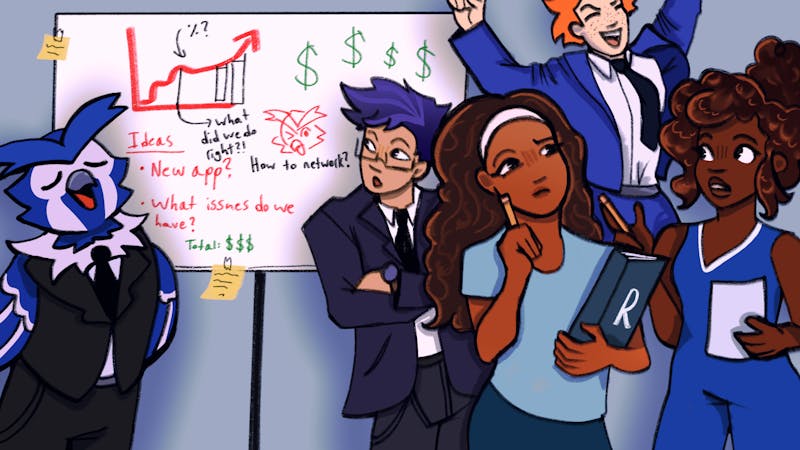‘Music is a tool for joy’: Lia Pikus receives Watson Fellowship to study music and prison abolition

Lia Pikus is no stranger to the intersection of seemingly unrelated passions. As a recipient of the Thomas J. Watson Fellowship, a grant that allows graduating seniors to pursue an independent study project outside of the United States, she is bringing together two passions of hers — music and prison abolitionism — for her project “Beyond the Bars: Music’s Role in Reimagining Punishment.” At some point in the near future, she will be setting off to observe inner-carceral music programming first hand and experience musical community on a global scale.
The Watson Fellowship has been on Pikus’s radar since freshman year, when she knew a recipient. Over time, Pikus said that she realized she wanted her project proposal to reflect her time studying policy in Spain and her interest in prison abolition.
“I’ve always kind of known I was going to apply, because I always had a passion for this intersection of music and social justice work that I pursued during my whole time at Rice and in high school even,” Pikus said. “But I didn’t know precisely what my proposal was until I started in criminal justice and did my research abroad.”
Throughout the process of applying, Pikus said that she felt lucky to have received a lot of support from those around her.
“I very much didn’t do this alone,” Pikus said. “I am so grateful to my very supportive community and the opportunities that I’ve been able to have that have given me the knowledge necessary to move forward with this. This whole process has made me feel very lucky.”
As a part of her study abroad program, Pikus completed an independent study project on why top-down reforms will never work in the United States, because the United States has a system designed to oppress and perpetuate power structures. She examined the restorative model in Norway, something she is looking forward to seeing firsthand in her research.
“Basically, what my project is going to do is pair with organizations doing inner-carceral music programming and see how music can be used,” Pikus said. “The [aspect] of music’s power that I want to look at is music’s ability to cultivate individual experiences of joy, so how music can be a cathartic individual experience.”
Pikus, a Baker College senior, said that music as a form of expression varies from culture to culture, but is still a powerful form of universal connection.
“I wouldn’t go so far necessarily to say music is a universal language, just because it manifests so differently and has such a different meaning in every culture,” Pikus said. “But in a more general sense, it really is a universal language and is a form of connection that can be really powerful and help us conceptualize new ideas and connect us to each other.”
On her fellowship year, Pikus said that she will not only look at inner-carceral music programming, but examine broader musical communities globally.
“I’m also going to be immersing myself in global musical cultures and looking at music’s relationship to the community and people’s relationship to each other through music,” Pikus said.
On a personal level, Pikus said that music has long been one of her tools for expression.
“I’ve been a musician since I was very little,” Pikus said. “I started playing cello when I was seven and came into Rice [as a] cello performance [major]. Studying music has been a lifelong passion of mine. For me, the bigger concept of music as a form of joy and catharsis has been a part of my life for a really long time, especially when I started songwriting in high school.”
Although her love for music was always there, Pikus said that her interest in music’s connection to prison abolition and inner-carceral programming was sparked through her research for the Texas Criminal Justice Coalition and was further cemented as she read abolitionist literature.
“I started reading a lot of [abolitionist literature], and I became more and more aware of the inefficacy of punishment and how abolition was truly the only way forward towards systems that aren’t created around maintaining hegemony and power structures,” Pikus said. “I came to understand and think about the power of joy in resisting punishment, and how music can be a really powerful tool in that sense, because it does that without engaging with these oppressive power structures.”
With this in mind, Pikus said that she began to think more critically about music’s role in systems of punishment.
“Music really is a tool for joy, and joy is a very legitimate form of resistance against systems of punishment,” Pikus said.
Pikus plans on sharing her research online through a blog, where she will share her experiences and research.
“I am planning on producing a blog where I catalog these experiences that I observe and the relationships between music, joy and community,” Pikus said. “I’m hoping to do a series of audio recordings of music-making in prisons, accompanied with interviews and hopefully photographs.”
Beyond the blog that makes up the project, Pikus said she is considering turning her research into a long-form piece informed by her experience in music journalism.
However, Pikus said that COVID-19 brings its own set of complications for her project, and she is waiting to see if she can defer her work for a year.
“My project really engages and looks at themes of community,” Pikus said. “There has to be community gathering for me to really do that. I don’t even know if the programs will be operational in prisons right now.”
Whether she receives that deferral or leaves to work on her project in August, Pikus said that she plans to take some time to rest — even if it is just for the summer after her graduation.
“Doing this double major [in political science and music] has been exhausting,” Pikus said. “I just feel like my whole college experience has been go, go, go. I’m going to focus on my music-making, my art, like my visual art, and odd jobs.”
While she is passionate about and looking forward to her project, Pikus said that she still needs the time to rest, because that same passion means that she will be working on the project without much of a break.
“The Watson is definitely an incredible opportunity, but it doesn’t feel like a break, because I want to do this work so well,” Pikus said. “It isn’t just a year of wandering around the globe. It’s definitely something that I want to put a lot of intention into. That does mean whether it’s just this summer or a year, if I’m given that deferral, I need rest.”
Pikus said that the process for applying for the Watson Fellowship helped her to realize what passions she wants to pursue throughout her life.
“[Applying] was a long process that necessitates you pouring your whole heart into it even though you know you probably won’t get it,” Pikus said. “It’s a long and intense process but a very fruitful one, regardless of what happens, because it makes you really think about yourself and what you want.”
More from The Rice Thresher


Sree’s Tiffin feeds a community of cravings
Of all the common sicknesses Rice undergraduate students face, none is more widespread than homesickness. Trisha Rangi said she understands what it’s like to miss things that feel like home, and she decided to do something about it.

New student center to ‘complete’ central quad
Breezeways, arches and outdoor seating will abound at the Moody Center Complex for Student Life set to break ground May 8. The 75,000-square-foot complex was designed by architecture firm Olson Kundig and has an expected completion date of fall 2027.

Please note All comments are eligible for publication by The Rice Thresher.